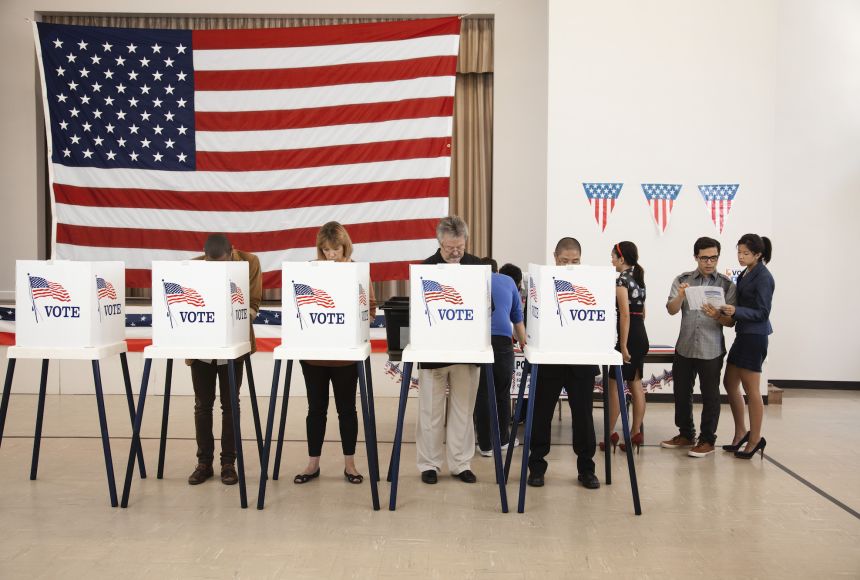A History of Voting in the United States
Today, most American citizens over the age of 18 are entitled to vote in federal and state elections, but voting was not always a default right for all Americans. The United States Constitution, as originally written, did not define specifically who could or could not vote—but it did establish how the new country would vote.
Article 1 of the Constitution determined that members of the Senate and House of Representatives would both be elected directly by popular vote. The president, however, would be elected not by direct vote, but rather by the Electoral College. The Electoral College assigns a number of representative votes per state, typically based on the state’s population. This indirect election method was seen as a balance between the popular vote and using a state’s representatives in Congress to elect a president.
Because the Constitution did not specifically say who could vote, this question was largely left to the states into the 1800s. In most cases, landowning white men were eligible to vote, while white women, black people, and other disadvantaged groups of the time were excluded from voting (known as disenfranchisement).
While no longer explicitly excluded, voter suppression is a problem in many parts of the country. Some politicians try to win reelection by making it harder for certain populations and demographics to vote. These politicians may use strategies such as reducing polling locations in predominantly African American or Lantinx neighborhoods, or only having polling stations open during business hours, when many disenfranchised populations are working and unable to take time off.
It was not until the 15th Amendment was passed in 1869 that black men were allowed to vote. But even so, many would-be voters faced artificial hurdles like poll taxes, literacy tests, and other measures meant to discourage them from exercising their voting right. This would continue until the 24th Amendment in 1964, which eliminated the poll tax, and the Voting Rights Act of 1965, which ended Jim Crow laws. Women were denied the right to vote until 1920, when the long efforts of the women’s suffrage movement resulted in the 19th Amendment.
With these amendments removing the previous barriers to voting (particularly sex and race), theoretically all American citizens over the age of 21 could vote by the mid 1960s. Later, in 1971, the American voting age was lowered to 18, building on the idea that if a person was old enough to serve their country in the military, they should be allowed to vote.
With these constitutional amendments and legislation like the Voting Rights Act of 1965, the struggle for widespread voting rights evolved from the Founding Fathers’ era to the late 20th century.
Why Your Vote Matters
If you ever think that just one vote in a sea of millions cannot make much of a difference, consider some of the closest elections in U.S. history.
In 2000, Al Gore narrowly lost the Electoral College vote to George W. Bush. The election came down to a recount in Florida, where Bush had won the popular vote by such a small margin that it triggered an automatic recount and a Supreme Court case (Bush v. Gore). In the end, Bush won Florida by 0.009 percent of the votes cast in the state, or 537 votes. Had 600 more pro-Gore voters gone to the polls in Florida that November, there may have been an entirely different president from 2000–2008.
More recently, Donald Trump defeated Hillary Clinton in 2016 by securing a close Electoral College win. Although the election did not come down to a handful of votes in one state, Trump’s votes in the Electoral College decided a tight race. Clinton had won the national popular vote by nearly three million votes, but the concentration of Trump voters in key districts in “swing” states like Wisconsin, Pennsylvania, and Michigan helped seal enough electoral votes to win the presidency.
Your vote may not directly elect the president, but if your vote joins enough others in your voting district or county, your vote undoubtedly matters when it comes to electoral results. Most states have a “winner take all” system where the popular vote winner gets the state’s electoral votes. There are also local and state elections to consider. While presidential or other national elections usually get a significant voter turnout, local elections are typically decided by a much smaller group of voters.
A Portland State University study found that fewer than 15 percent of eligible voters were turning out to vote for mayors, council members, and other local offices. Low turnout means that important local issues are determined by a limited group of voters, making a single vote even more statistically meaningful.
How You Can Make Your Voice Heard
If you are not yet 18, or are not a U.S. citizen, you can still participate in the election process. You may not be able to walk into a voting booth, but there are things you can do to get involved:
- Be informed! Read up on political issues (both local and national) and figure out where you stand.
- Get out and talk to people. Even if you cannot vote, you can still voice opinions on social media, in your school or local newspaper, or other public forums. You never know who might be listening.
- Volunteer. If you support a particular candidate, you can work on their campaign by participating in phone banks, doing door-to-door outreach, writing postcards, or volunteering at campaign headquarters. Your work can help get candidates elected, even if you are not able to vote yourself.
Participating in elections is one of the key freedoms of American life. Many people in countries around the world do not have the same freedom, nor did many Americans in centuries past. No matter what you believe or whom you support, it is important to exercise your rights.
